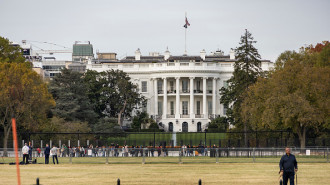Gaza: More than 338,000 people displaced amid Israeli onslaught
More than 338,000 people have been forced to flee their homes in the Gaza Strip, the United Nations said, as heavy Israeli bombardments continue to hit the Palestinian enclave.
"Mass displacement across the Gaza Strip continues," the UN humanitarian agency OCHA said in a statement sent on Thursday.
By late Wednesday, the number of displaced people in Gaza had risen by an additional 75,000 people from the figure given 24 hours earlier, reaching 338,934, it said.
The announcement came as Israel pounded the Gaza Strip -- a densely populated enclave of 2.3 million people.
Israeli forces said 1,200 people were killed in the onslaught -- the worst in the country's history.
In Gaza, officials reported more than 1,000 people have been killed in Israel's sustained campaign of air and artillery strikes.
Israel's defence minister Yoav Gallant labeled Palestinians living in the Gaza Strip as "human animals" as part of his announcement of a total siege on the coastal enclave, as the fighting between Israeli forces and Hamas militants enters its fourth day 👇
— The New Arab (@The_NewArab) October 10, 2023
🎥: @alexander_durie pic.twitter.com/AgRQAqXa4F
OCHA said nearly 220,000 people, or two-thirds of the displaced people, have sought shelter in schools run by the UN agency supporting Palestinian refugees, UNRWA.
Another nearly 15,000 people fled to schools run by the Palestinian Authority, while more than 100,000 were being sheltered by relatives, neighbours and a church and other facilities in Gaza City.
OCHA said that around 3,000 people had already been displaced within the enclave prior to Saturday's attack.
The bombing campaign has destroyed or rendered uninhabitable at least 2,540 housing units in Gaza, OCHA said, citing numbers from the Gaza Ministry of Public Works and Housing.
Another 22,850 housing units sustained moderate to minor damage, it said.
The UN agency also voiced alarm at the significant destruction of civilian infrastructure damaged in the shelling.
Among other things, it said sewage facilities serving more than a million people had been hit by air strikes, leaving solid waste accumulating in the streets, posing a health threat.







 Follow the Middle East's top stories in English at The New Arab on Google News
Follow the Middle East's top stories in English at The New Arab on Google News


